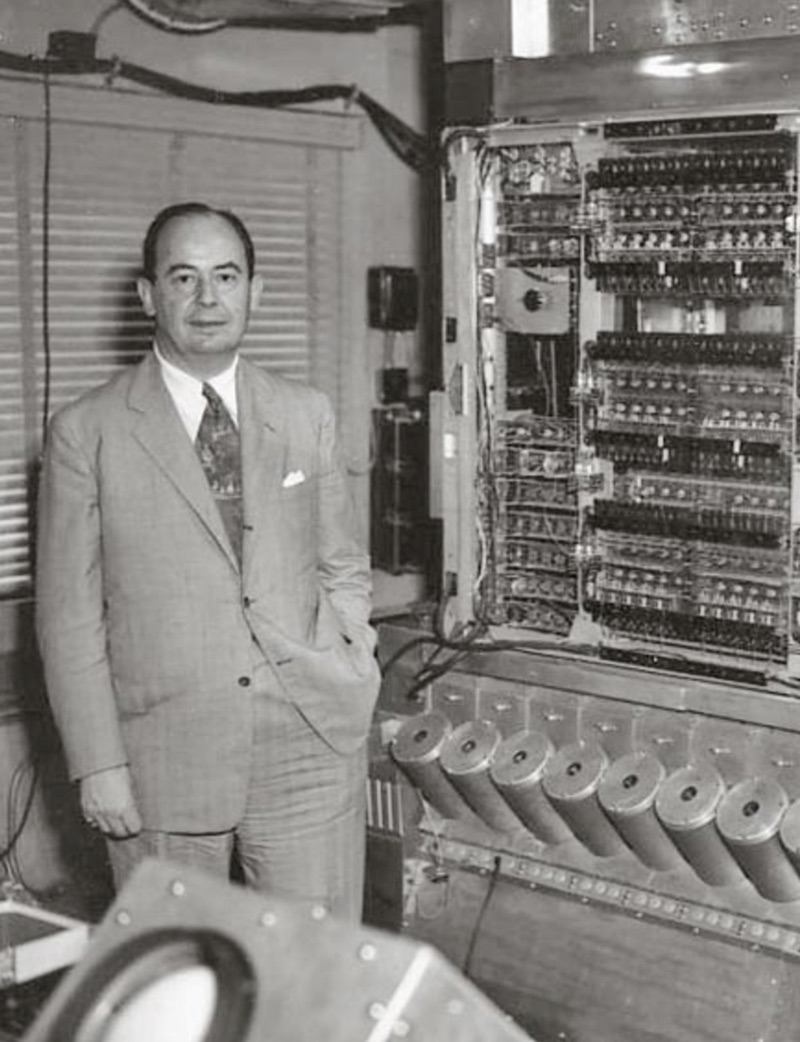Janos Neumann: A Pioneering Figure in Mathematics and Computer Science
Janos (John) von Neumann, a Hungarian-American mathematician, physicist, and computer scientist, was a pioneering figure who made significant contributions to various fields, including quantum mechanics, game theory, and the development of the modern computer. His remarkable intellect, groundbreaking ideas, and lasting impact on the scientific community have cemented his place as one of the most influential thinkers of the 20th century.

Early Life and Education: Janos Neumann was born on December 28, 1903, in Budapest, Hungary, to a wealthy and well-educated Jewish family. He showed prodigious talent from a young age, particularly in mathematics, and began studying advanced topics while still in high school. In 1921, Neumann enrolled at the University of Budapest to study chemistry, but later switched to mathematics. He also attended the University of Berlin and the Swiss Federal Institute of Technology in Zurich, ultimately earning a degree in chemical engineering and a Ph.D. in mathematics.
Career and Achievements: Neumann's career began in academia, where he held various teaching positions at prestigious institutions such as the University of Berlin, the University of Hamburg, and Princeton University. In 1933, he joined the Institute for Advanced Study in Princeton, where he worked alongside other great minds like Albert Einstein and Kurt Gödel.
During this time, Neumann made significant contributions to the field of mathematics. One of his most notable achievements was the development of the mathematical foundation for quantum mechanics, particularly through the introduction of the concept of "density matrices." He also made important advances in functional analysis, set theory, and topology.
In addition to his work in pure mathematics, Neumann was instrumental in the development of game theory, a field of study that analyzes strategic decision-making in competitive situations. His book, "Theory of Games and Economic Behavior" (co-authored with Oskar Morgenstern), laid the groundwork for modern game theory and had a profound impact on economics, political science, and other disciplines.
During World War II, Neumann turned his attention to applied mathematics and became involved in the Manhattan Project, the top-secret U.S. government initiative to develop the atomic bomb. He contributed to the project by developing the implosion method, which was critical for the successful construction of the plutonium bomb.
Post-War Contributions and the Development of the Modern Computer: After the war, Neumann shifted his focus to the emerging field of computer science. He played a crucial role in the development of the Electronic Discrete Variable Automatic Computer (EDVAC), one of the earliest electronic computers. Neumann's pioneering ideas, such as the stored-program concept, the use of binary arithmetic, and the development of a central processing unit (CPU), laid the foundation for the architecture of modern digital computers, now commonly referred to as the "von Neumann architecture."
Neumann also contributed to the development of cellular automata, mathematical models that simulate the behavior of complex systems. His work on self-replicating automata, which are theoretical constructs capable of reproducing themselves, has had a lasting impact on fields such as artificial life and theoretical biology.
Impact on the World: Janos Neumann's contributions to mathematics, computer science, and other fields have had a profound and lasting impact on the world. His work in quantum mechanics has helped shape our understanding of the fundamental nature of the universe, while his research in game theory has provided invaluable insights into human behavior and decision-making in various contexts. The development of the modern computer, built upon the principles of the von Neumann architecture, has revolutionized the way we live, work, and communicate, enabling countless technological advancements that define our modern world.
Inventions: Although Neumann did not directly invent specific devices or machines, his groundbreaking ideas and theoretical contributions laid the foundation for numerous innovations in various fields. Some of the most significant inventions and concepts that can be attributed to his work include:
Von Neumann architecture: The principles behind the design of modern digital computers, such as the stored-program concept, the use of binary arithmetic, and the development of a central processing unit (CPU), are based on Neumann's ideas. This architecture has been the cornerstone of computer design since its inception and continues to influence the development of new computing technologies.
Game theory: Neumann's work, along with that of Oskar Morgenstern, in developing the mathematical framework for game theory has had far-reaching applications in economics, political science, biology, and other fields. Game theory is now an essential tool for understanding strategic decision-making in a wide range of contexts, from business negotiations to international diplomacy.
Cellular automata: Neumann's research into cellular automata, particularly his work on self-replicating automata, has inspired ongoing research in artificial life, theoretical biology, and computer science. These models have been used to explore complex systems, such as the behavior of living organisms, the spread of diseases, and the development of artificial intelligence.
Conclusion: Janos Neumann was a brilliant and prolific thinker whose work has had a lasting impact on various scientific disciplines. His contributions to mathematics, computer science, and other fields have shaped our understanding of the world and enabled countless technological advancements. As a pioneering figure in the development of the modern computer and a trailblazer in the fields of quantum mechanics and game theory, Neumann's legacy continues to inspire new generations of researchers and innovators. His life and work serve as a testament to the power of creative thinking and the importance of interdisciplinary collaboration in advancing human knowledge and understanding.